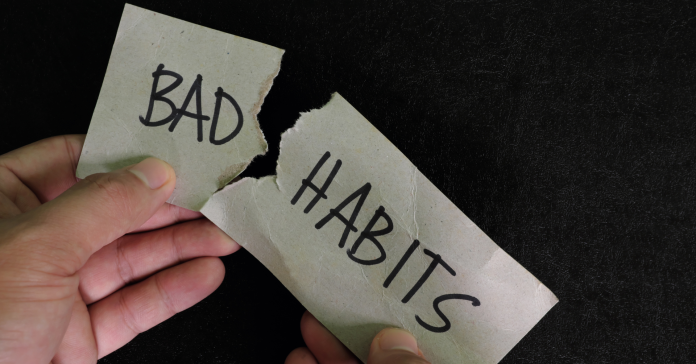While these may seem minor, they can have a significant impact on your health over time. Have you identified any of these harmful habits in your lifestyle?
1) Holding your pee
It’s important to heed nature’s call promptly! Holding in your urine for extended periods can negatively impact your health. Urine acts like a flowing stream, and blocking it can lead to stagnant conditions where bacteria thrive, potentially causing bladder and kidney infections. This risk is higher if you have underlying urological issues or during pregnancy. Studies suggest that prolonged holding can stretch the bladder, known as “infrequent voiders syndrome.” Moreover, not urinating four to seven times a day indicates inadequate fluid intake, possibly leading to dehydration.
2) Biting your nails
Chewing on your nails is a harmful nervous habit. It can lead to nail damage, skin infections like paronychia, and the spread of germs. This can also introduce viruses into your system, causing various infections. Moreover, nail biting can harm your teeth, potentially leading to tooth damage or cracks. Addressing the psychological reasons behind this habit is crucial, as it’s often linked to subconscious actions triggered by anxiety, boredom, or frustration. A study from Canada even suggests that nail biting is common among perfectionists.
3) Staring at a computer all day
The average office worker spends around seven hours a day looking at a computer screen, leading to computer vision syndrome. Prolonged screen time can cause eye strain and potential retinal damage. One helpful tip is to follow the 20-20-20 rule: every 20 minutes, take a 20-second break to look at something 20 feet away. This practice reduces eye strain and promotes blinking, which can alleviate dry and irritated eyes. Additionally, minimizing screen exposure, especially from phones and tablets, before bedtime can improve sleep quality.
4) Skipping brushing or flossing
It’s common to feel exhausted and skip brushing or flossing before bed, but this habit can have more serious consequences than you might realize. Regularly skipping dental care increases the risk of dental decay, which can lead to major infections, malnutrition, and even cardiovascular disease, particularly in older adults. To maintain good oral health, it’s essential to brush your teeth twice daily, floss once a day, and visit your dentist regularly. Consider using an electric toothbrush for a more thorough clean and to reach areas that regular brushes may miss, preventing cavities and gum infections that can result in early tooth loss.
5) Sitting for too long
Prolonged sitting, coupled with excessive screen time, can have detrimental effects on our health. This sedentary behavior is linked to various health risks such as weight gain, diabetes, and high blood pressure. However, incorporating regular walking breaks throughout the day can help mitigate these risks, prevent arthritis, and maintain healthy blood pressure levels. It’s crucial to maintain good posture while sitting to avoid neck and backaches. Ensure you sit upright with your back against the chair, knees at 90-degree angles, and feet flat on the floor to reduce tension on your back muscles.
6) Carrying a heavy bag on one shoulder
Carrying a large handbag may make us feel prepared, but unless it’s a backpack, it could be harming our health. The weight of a heavy bag on one side can disrupt the alignment of the neck, leading to pressure on the nerves that supply sensation to the arms. This can result in numbness, tingling, and pain in the shoulders and arms. It’s recommended that your bag should not exceed ten percent of your body weight to avoid these negative effects. Additionally, constantly carrying your bag on the same side can exacerbate these issues, so try to switch sides regularly. Avoid using your phone while carrying the bag, as it can further disrupt your alignment. Men should also be cautious about carrying wallets in their back pockets, as it can lead to back problems.
7) Wearing the wrong shoes
Wearing high heels can be tough on your feet, and the effects can extend throughout your body. Dr. South-Paul notes that footwear plays a significant role in foot, knee, hip, and back health, and high heels can lead to issues like bunions, tight Achilles tendons, and related problems. However, it’s not just stilettos causing trouble – shoes without proper support, like flip-flops, can also cause damage. Research from Auburn University highlights that flip-flops alter your walking pattern, potentially causing issues from your feet to your hips and lower back. For long-term comfort, ensure your feet and ankles have adequate support, especially during workouts. Dr. South-Paul advises replacing running shoes after about 480km to maintain proper support and prevent foot soreness and stress fractures.
8) Not applying sunscreen everywhere
We all know the importance of sunscreen to shield ourselves from the sun’s harmful rays. However, it’s easy to rush through applying it, leaving certain areas vulnerable. The most critical spots to cover are the face, trunk, hands (including between the fingers), and feet (including the spaces between toes and nail beds). The Cleveland Clinic warns that ears are also prone to skin cancer, so don’t forget to protect them with sunscreen. Often overlooked areas include the scalp (even with hair), eyelids, lips, neck, and armpits. Remember to reapply sunscreen regularly, especially when enjoying outdoor activities.
9) Experiencing irregular sleeping patterns
Achieving consistent and quality sleep is essential for our overall well-being, yet many struggle with habits that disrupt their sleep patterns. These include irregular bedtimes, watching TV late into the night, relying on alcohol or caffeine to unwind or stay alert, and engaging in intense exercise close to bedtime. These behaviors can significantly impact sleep quality. Additionally, repeatedly hitting the snooze button can lead to fragmented sleep and sleep inertia, leaving you groggy and less rested during the day.



